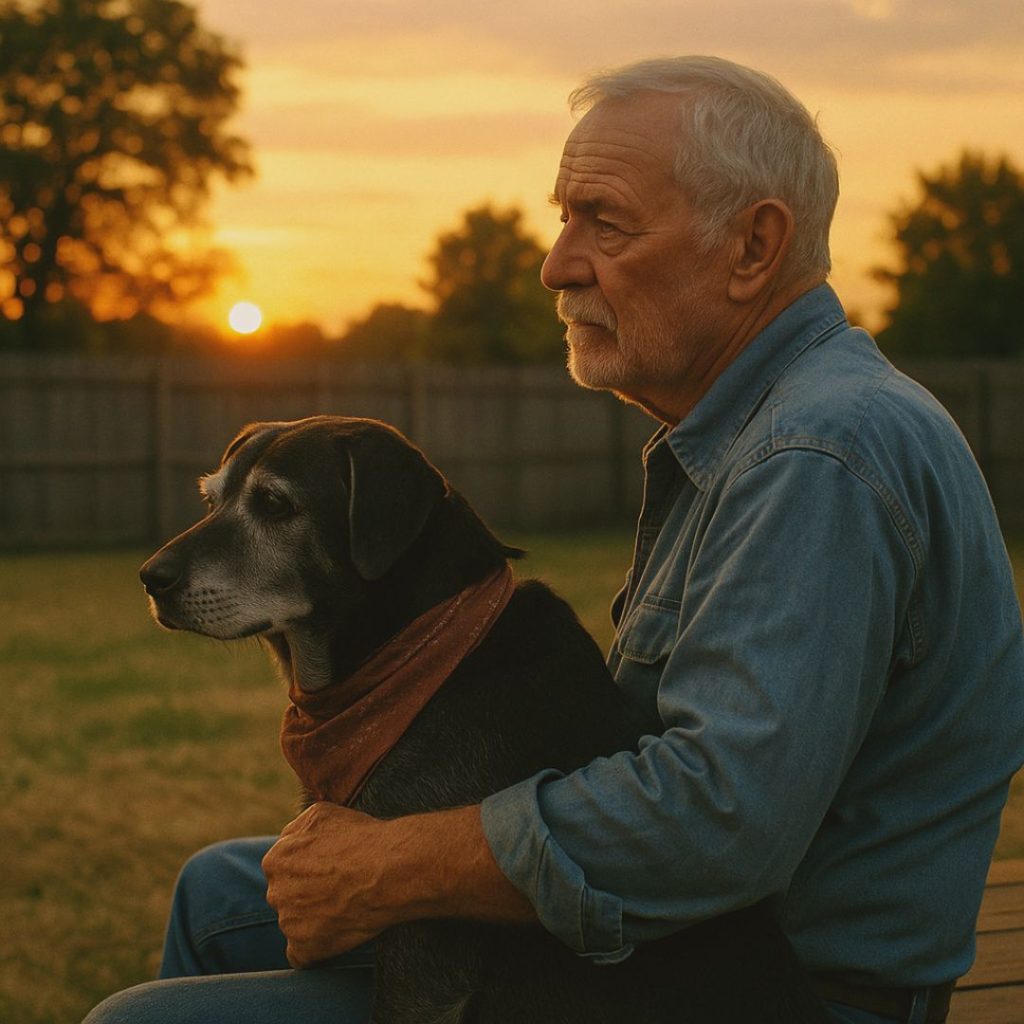🔹 Part 9– The Empty Seat
The house felt too quiet after Diesel.
There were no claws tapping across the floor, no breath rising and falling in rhythm with mine.
No shadow waiting at the door.
The silence wasn’t sharp—it was soft, like a memory settling into its final shape.
I still kept his bowl in the corner, though it stayed empty.
His blanket folded on the rocker. His photo on the mantel.
Not because I couldn’t let go, but because letting go didn’t mean forgetting.
Some mornings, I still poured two cups of coffee—one for me, one poured into the hubcap out back.
Habit is a powerful thing.
So is love.
Melissa called more often now.
We talked about little things—the weather, the boys, what I was fixing in the garage.
One day she said, “I think you should write down your stories. The ones about the road. About you and Diesel.”
I told her I didn’t know how to write.
She said, “Then just talk. I’ll do the rest.”
So I did.
Got a tape recorder from the thrift store, sat in the shed with the door open, and started talking.
I talked about Bakersfield sunrises and North Carolina snow.
About a dog with torn ears and a brave heart who chased the world from a passenger seat.
It helped.
It was like driving again—mile after mile, only now the map was memory and the road was words.
Neighbors still stopped by Diesel’s grave sometimes.
Left flowers. Painted stones. One kid left a toy semi-truck with a note that said:
“For Diesel. You were the best driver’s helper ever.”
I built a small bench by the oak tree, just behind the cedar marker.
Most evenings, I sat there, sipping tea, watching the sun drop behind the fence line.
And I’d feel him there—not as a ghost, but as presence.
Like the rumble of an engine far off on the interstate, steady and sure.
One night, I said aloud,
“You made retirement bearable, boy. You taught me how to stop.”
And I meant it.
Because before Diesel, stopping had felt like dying.
But with him, I learned that even stillness can be full of motion—if your heart remembers where it’s been.
🔹 Part 10– The Road Ahead
Spring came quiet and kind.
The backyard bloomed in patches—wildflowers, weeds, and memory.
Diesel’s oak tree stood taller somehow, its branches reaching outward like arms that remembered how to hold.
I visited his grave every day.
Not out of grief. Out of gratitude.
Some days I brought a story. Some days, just silence. But every visit felt like part of a ritual—like checking the oil before a long drive.
Then, one morning, a sound at the porch caught my ear.
I opened the door, and there she was.
Small. Scrappy. Black and white coat, ears too big for her head.
Looked like trouble. Looked like need.
She didn’t bark. Just stared with eyes that asked, Is there room here?
I stood a moment. Looked past her to the road. Then back at the empty rocker.
And I said softly, “You’re early. I was just about to make coffee.”
She trotted in like she’d always belonged.
I named her Penny.
She didn’t replace Diesel. No dog ever could.
But she filled the space he left with her own kind of magic—lighter, bouncier, a spark instead of an ember.
And she brought laughter back to the porch.
We started walking again. Just around the block at first, then down to the creek.
She tugged the leash like she had somewhere urgent to be.
I let her lead. I was in no rush.
At the shed, I added a new tack to the map—right there on the edge of Stillwater, marked with a pawprint and the name Penny.
Because every journey has a beginning.
And sometimes, the road doesn’t end—it just shifts into something quieter, softer.
One evening, I sat on the bench beneath the oak and Penny jumped up beside me.
The sun dipped low, painting the sky in Diesel’s favorite shade of amber.
And for a long while, we just watched.
No need for words.
Just the wind. The leaves. The sound of one story ending, and another beginning.
And I thought—maybe the highway never really disappears.
Maybe it just moves inside us.
Carried on the breath of old dogs and new beginnings.
Lit by fireflies and headlights and the quiet hum of a heart still traveling.


